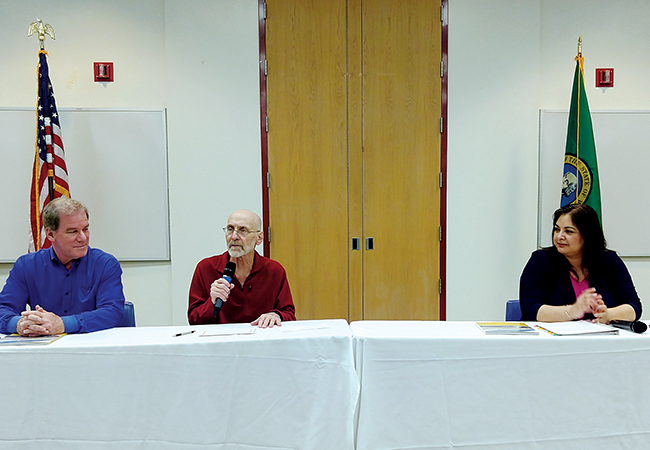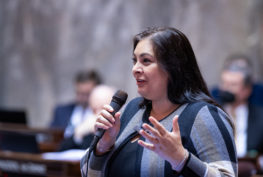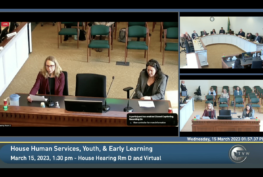From the Woodinville Weekly
Very few bills are directly benefiting Eastside cities during this short legislative session. Aside from various capital budget projects around the county, Woodinville has not been impacted.
With 20 days left in the 60-day session, legislators will be working to pass measures that advance state priorities. Sen. Manka Dhingra, Rep. Roger Goodman and Rep. Larry Springer represent neighborhoods in Woodinville, Duvall, Kirkland, Redmond and Sammamish.
Citizens in the 45th District had two separate opportunities to discuss pending bills and important issues with their local legislators Feb. 20 and 22. The Town Hall covered topics related to car tabs, education and the environment. Springer shared his new bill to combat homelessness and housing affordability in King County.
“The bill essentially sets up a system by which employers would pay a payroll tax based on certain criteria and level of income,” Springer said. “Interestingly, the idea was brought up by the business community.”
He said about 10 major employers in the state, including those at Starbucks, Amazon, Expedia and Microsoft, want to help with the housing crisis and are willing to pay. The payroll tax would generate about $120-150 million each year in King County, he added.
In the next 20 years, Springer said this revenue stream could raise up to $1 billion, which would then be distributed to the county, the city of Seattle and other suburban cities for shelters and affordable housing projects.
“I’m just really excited about the stakeholders that are supporting this bill because it really is about the understanding that this issue impacts each and every one of us who live in this community,” Dhingra said. “It is not about us versus them.”
Dhingra said more tech companies and industries are moving to the Eastside, including a potential new satellite division of Google in Redmond. Businesses flock towards talent and locality, which will eventually provide more job opportunities in the 45th District, she added.
“There’s a lot of partnerships that are already occurring without the need of government being involved at this time,” she said.
She said many companies offer incentives to students interested in computer science and technology, providing them with scholarships and internship opportunities in the summer and during the school year.
In the last session, the legislature focused more on higher education to ensure all students can access college without extreme debt. Dhingra said she is continuing to look at trauma-informed care and adverse childhood experiences to meet the needs of students across the district.
This session has placed more emphasis on early learning and pre-K education to prepare students for success in school. Goodman said he has been working on legislation to expand access to high-quality preschool.
“Public education is, first of all, in the state constitution as our top priority,” Goodman said. “But it just makes sense to make it our top priority in any event. Everything comes back to education.”
Springer said the state has spent an additional $10 billion over the last six years to support the K-12 system. About 52% of the entire state budget goes to K-12 education, he added.
Another financially debated topic on the minds of many is Tim Eyman’s car tab initiative. Springer said the law passed by voters will have a “devastating effect” on the people least able to get around.
“The cold hard reality of that car tab initiative is that we will lose 40,000 hours per year of Metro bus service in our region,” he said. “That will be particularly impactful for developmentally disabled residents of the district, as well as the elderly who depend on paratransit.”
Even though the initiative is being challenged in court, Goodman said there is a high probability that it will remain an effective law. He added that this law creates a $2 billion loss in funding, which would otherwise go towards bike lanes, pedestrian pathways, fish culverts and other transportation-related expenses.
“In the future, we’re going to have to figure out a way to finance transportation projects,” he said. “The next biennium, we’re probably going to be considering a comprehensive transportation finance package.”
By Madeline Coats




